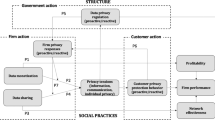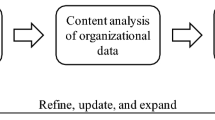Abstract
In this paper, we develop a synthesizing framework for information exchange. In particular, we identify the drivers of both the content of information exchange as well as the choice of the technology used to facilitate information exchange across multiple organizations. Our first driver is the inter-organizational architecture. Unlike the general architectures developed by Williamson [11] and Adler [1], we focus specifically on the effect of architectures on information exchange. We classify the existing architectures in three dimensions, namely, customization, information sharing or trading and closed or open networks. Such a classification enables us to identify particular architectural characteristics that affect content and technology choices. Our second driver refers to the characteristics of the information, the system, the network and the regulatory environment that affect the credibility and usefulness of information exchange for the participants. Our third driver is the incentive structure in the architecture. Only the information that is deemed to be mutually beneficial by all participants will get exchanged. The incentive structure highlights the cost-benefit trade-offs of individual participants. We also place all the five papers accepted for this special issue within this synthesizing framework. Such positioning allows us to identify potential areas for future research and exploration.
Similar content being viewed by others
References
P.S. Adler, Market, hierarchy and trust: the knowledge economy and the future of capitalism, Organization Science 12(2) (2001) 215–234.
T.H. Davenport and L. Prusak, Working Knowledge: How Organizations Manage What they Know (Harvard Business School Press, Boston, MA, 1998).
A.M. Fairchild, Decision Management: Role and Effect of Using an Intelligent Intermediary to Aid in Information Sharing. Special Issue on Information Sharing across Multiple Organizations—Journal of Information Technology and Management (Forthcoming, 2006).
S. Huesemann, Information Sharing Across Multiple Humanitarian Organizations—A Web-Based Information Exchange Platform For Project Reporting. Special Issue on Information Sharing across Multiple Organizations—Journal of Information Technology and Management (Forthcoming, 2006).
W. Masuchun, S. Davis and R. Rangsaritratsamee, System for Supply Network Management. Special Issue on Information Sharing across Multiple Organizations—Journal of Information Technology and Management (Forthcoming, 2006).
G. Mentzas, D. Apostolou, K. Kafentzis and P. Georgolios, Inter-Organizational Networks for Knowledge Sharing and Trading. Special Issue on Information Sharing across Multiple Organizations — Journal of Information Technology and Management (Forthcoming, 2006).
R. Muller, M. Spiliopoulou and H.-J. Lenz, Electronic marketplaces of knowledge: characteristics and sharing of knowledge. Proceedings of the International Conference on Advances in Infrastructure for e-business, e-education and e-medicine on the internet, Italy, 2002.
T.A. Pardo, A.N. Cresswell, F. Thompson and J. Zhang, Knowledge Sharing in Cross-boundary Information System Development in the Public Sector. Special Issue on Information Sharing across Multiple Organizations—Journal of Information Technology and Management (Forthcoming, 2006).
S. Radhakrishnan and B. Srinidhi, Sharing demand information in a value chain: implication for pricing and profitability, Review of Quantitative Finance and Accounting 24(1) (2005) 23–45.
P. Weill, Leveraging the New Infrastructure: How Market Leaders Capitalize on Information Technology (Harvard Business School Press, Boston, MA, 1998).
O.E. Williamson, Comparative economic organization: the analysis of discrete structural alternatives, Administrative Science Quarterly 36 (1991) 269–296.
A. Zaheer, B. McEvily and V. Perrone, Does trust matter? Exploring the effects of inter-organizational and inter-personal trust on performance, Organization Science 9(2) (1998) 141–158.
Author information
Authors and Affiliations
Corresponding author
Rights and permissions
About this article
Cite this article
Tayi, G.K., Srinidhi, B. A synthesizing framework for technology and content choices for information exchange. Inf Technol Manage 7, 239–247 (2006). https://doi.org/10.1007/s10799-006-0274-x
Issue Date:
DOI: https://doi.org/10.1007/s10799-006-0274-x




